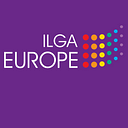How the EU Strategy on the Rights of the Child will protect LGBTI kids
From committing to end intersex genial mutilation to improving freedom of movement for rainbow families, find out in our blog why this new EU strategy is great news for LGBTI kids.

“Children’s rights are human rights”.
On 24 March 2021, the European Commission published the EU Strategy on the Rights of the Child. Protecting and promoting the rights of the child is a core objective of the EU and therefore, the strategy aims to “build the best possible life for children in the EU and across the globe.” It strongly complements the EU LGBTIQ Equality Strategy 2020–2025, committing to clear actions to end intersex genital mutilation, tackle online bullying of LGBTI youth, and improve free movement for rainbow families.
Here are the key points of the strategy that focus on LGBTI kids:
It acknowledges the similarities between intersex genital mutilation and female genital mutilation
Intersex genial mutilation (IGM) and female genital mutilation (FGM) have, unfortunately, a lot in common. In the strategy the EC is explicitly acknowledging so by noting that “more than 200 million women and girls worldwide are survivors of FGM, including over 600.000 in the EU. 62% of intersex people who had undergone a surgery said neither they nor their parents gave fully informed consent before medical treatment or intervention to modify their sex characteristics.
To put an end to this, the key action by the EC will be to “support the exchange of good practices on ending non-vital surgery and medical intervention on intersex infants and adolescents to make them fit the typical definition of male or female without their or their parents’ fully informed consent (IGM).”
It will tackle cyber harassment of LGBTI children
Children experience violence at school and online. According to the 2018 PISA results, 23% of students reported being bullied at school. On cyber harassment, the strategy points out that “almost one third of girls and 20% of boys experienced disturbing content once a month in the past year; and children from minorities encounter upsetting events online more frequently.” The latest Fundamental Rights Agency survey on LGBTI people in the EU shows that amongst LGBTI 15–17 years old respondents, 15% have experienced cyber harassment due to their sexual orientation, gender identity, or sex characteristics.
To tackle this, the EC will update the Better Internet for Kids Strategy in 2022 in order to raise awareness of and build capacity around cyberbullying, recognise mis- and disinformation, and promote healthy and responsible behaviour online.
It will improve freedom of movement for rainbow families
The right to freedom of movement and residence of EU citizens is the cornerstone of the European Union, however, this is far from being true for rainbow families. A baby with two mothers is currently at risk of statelessness, and Clai Hamilton, spouse of Romanian Adrian Coman, has not been granted residency in Romania yet, after an European Court issued a landmark judgement in their favour. In the strategy, the EC proposes a horizontal legislative initiative for 2022 to support the mutual recognition of parenthood between EU countries.
With their first ever Strategy on the Rights of the Child, the European Commission has explicitly acknowledged the specific discriminations and challenges faced by LGBTI children. In addition to the above-mentioned points, the Strategy recognises the need to pay specific attention to LGBTI children in the areas of health, education, socioeconomic inclusion, housing and protection from discrimination, both online and offline.
ILGA-Europe will now work with our partners and the European Commission to ensure the implementation of commitments made in the Strategy to address these issues, and to ensure that solutions reach and include LGBTI children across Europe.








